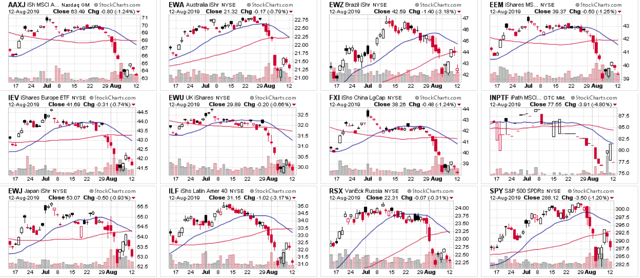Summary
During the global financial crisis, I regularly called a close friend in NYC to comment on then-daily economic events that were shocking. Bear Stearns went bankrupt; Lehman went bankrupt; the economy shed 600,000 jobs per month. While the build-up to the crisis was amazingly slow, once the bottom dropped, it dropped hard.
That event stands in stark contrast to the last 12 to 18 months when there's been a continual grinding lower in the global economic data, primarily centered in the manufacturing sector. At first, it was only anecdotal in nature, with various Market PMI or US ISM reports noting concern among respondents about tariffs. That concern eventually lowered sentiment, which led to a drop in new orders and eventually activity. That is now hitting the financial markets.
Let's look at some of the larger, non-US economies, starting with China. The annual GDP growth rate continues to trend lower; it is now at 6.2%. The slowdown is partially caused by basic economics: the country is now transitioning from emerging to developed economy, which naturally implies a slower growth rate. But the trade war with the US is starting to bite. With the exception of a few spikes over the last 12 months, industrial production has been trending lower month over month, declining from slightly over 7% to 5%. The Markit economics manufacturing PMI has hovered around the 50 level (which separates expansions from contractions) for the last several months. Exports dropped as usual at the beginning of this year. They have since rebounded, but haven't advanced through last year's levels, indicating a moderating demand picture. Retail sales were also declining on a Y/Y basis until the last few months; we need more data to determine if the recent increase is a break in trend or simply the result of short-term stimulus impacting the numbers. Worst of all, there is no indication of any let-up in the trade war with the US. Some analysts are now assuming it won't be resolved until after the 2020 election.
On an annualized basis, Japan's economy has grown between 1.6% and 2.8% over the last three quarters. But it has contracted in two of the last six. Industrial production has contracted in seven of the last 12 months on a year-over-year basis. Manufacturing PMI has been below 50 in five of the last six months, indicating the manufacturing sector is contracting. After rising in the second and third quarters of 2018, retail sales are back to growing at a year-over-year rate of 0.5% to 1%. Twice this year, exports have dropped sharply in a monthly report. The latest trade data once again shows a monthly decline. The Bank of Japan continues to use a "yield curve control" policy for interest rates: The bank is buying 10-year government bonds to keep rates around 0% to increase inflation and encourage growth. The effort has had little to no effective long-term impact.
I've been writing about Brexit for what seems like forever, describing it as an event that has "the law of unintended consequences" written all over it. Brexit is finally starting to hit UK data. GDP contracted 0.2% in the 2Q, with manufacturing and construction shrinking. The rolling three-month average was also negative, falling 0.2%. And that's not all: manufacturing declined 2.8% in the latest report, dragging overall production 1.4%. lower. Manufacturing PMI has been below 50 for the last three months. The potential for a mid-summer Brexit pulled orders forward into the 1H19, which caused the drop in post-first Brexit deadline activity. The Bank of England sees these problems continuing. From their latest policy statement (emphasis added):
Looking through recent volatility, underlying growth appears to have slowed since 2018 to a rate below potential, reflecting both the impact of intensifying Brexit-related uncertainties on business investment and weaker global growth on net trade. Evidence from companies, up to the middle of July, suggests that uncertainty over the United Kingdom’s future trading relationship with the European Union has become more entrenched.
The BOE went on to note:
Increased uncertainty about the nature of EU withdrawal means that the economy could follow a wide range of paths over coming years
Translation: the UK is in for a very bumpy economic ride.
Germany is also experiencing a great deal of trade-related pain. On Tuesday, the Financial Times reported that recession fears in that country are growing. The annual GDP growth rate has ground lower over the last three quarters. Previously, it printed between 1.9% and 2.8%. Since 3Q19, annual growth has been between 0.6% and 1.1%. Like the other three countries above, the problem is occurring in the manufacturing sector: The Markit PMI has been below 50 for the last seven months. The situation is growing worse according to the latest Markit report (emphasis added):
IHS Markit Conditions in Germany's manufacturing sector showed the greatest deterioration for seven years in July, according to the latest PMI® data from IHS Markit and BME, led by the steepest drop in new export orders since 2009. Output also fell at a faster pace, with manufacturers making more aggressive cuts to employment and purchasing activity.
Today, German investor sentiment cratered 19.6 points.
All of this weakness centers on manufacturing and trade-related issues, as noted by the OECD in its latest Economic Outlook (emphasis added):
A year ago, the OECD warned about how trade and policy uncertainties could significantly damage the world economy and further contribute to the growing divide between people. A year later, global momentum has weakened markedly and growth is set to remain subpar as trade tensions persist. Trade and investment have slowed sharply, especially in Europe and Asia. Business and consumer confidence have faltered, with manufacturing production contracting.
The IMF recently made a similar observation (emphasis added):
Manufacturing purchasing manager indices continue to decline alongside worsening business sentiment as businesses hold off on investment in the face of high uncertainty. Global trade growth, which moves closely with investment, has slowed significantly to 0.5 percent (year-on-year) in the first quarter of 2019, which is its slowest pace since 2012.
All of this is starting to hit global equity markets:

Above are 12 ETFs that track the major global equity indexes. All have dropped over the last two months. Some have been trending lower for about a month while others were trending modestly higher before falling with the US market last week. Regardless, the markets have clearly noticed.
What are the possibilities of this changing? Not much right now. The US-China trade war is the primary cause of these events, with a helping hand from Brexit and now, the Japan-South Korea spat along with India's changing constitutional regime regarding Kashmir. Throw in the already-weaker economic fundamentals of Japan and the EU (both are dealing with the long-term negative effects of an aging population) and you have the recipe for continued weaker economic growth.
